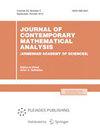全函数及其高阶差分算子
IF 0.4
4区 数学
Q4 MATHEMATICS
Journal of Contemporary Mathematical Analysis-Armenian Academy of Sciences
Pub Date : 2023-12-28
DOI:10.3103/s1068362323060043
引用次数: 0
摘要
Abstract In this paper, we prove that for a transcendental entire function \(f\) of finite order such that \(\lambda(f-a)<\rho(f)\), where \(a\) is an entire function and satisfies \(\rho(a)<;\),如果(delta_{c}^{n}f)和(f)共享整个函数(b),满足(rho(b)</rho(f)),那么(n\in\mathbb{N}\),如果(delta_{c}^{n}f)和(f)共享整个函数(b),满足(rho(b)</rho(f))。CM, where \(c\inmathbb{C}\) satisfies \(\Delta_{c}^{n}f\not\equiv 0\), then \(f(z)=a(z)+de^{cz}\), where \(d,c\) are two nonzero constants.特别是,如果 \(a=b\) ,那么 \(a\) 就会简化为一个常数。这一结果改进并推广了 Chen and Chen [3]、Liao and Zhang [10] 和 Lü et al.此外,我们还列举了一些相关的例子来巩固我们的结果。本文章由计算机程序翻译,如有差异,请以英文原文为准。
Entire Functions and Their High Order Difference Operators
Abstract
In this paper, we prove that for a transcendental entire function \(f\) of finite order such that \(\lambda(f-a)<\rho(f)\), where \(a\) is an entire function and satisfies \(\rho(a)<\rho(f)\), \(n\in\mathbb{N}\), if \(\Delta_{c}^{n}f\) and \(f\) share the entire function \(b\) satisfying \(\rho(b)<\rho(f)\) CM, where \(c\in\mathbb{C}\) satisfies \(\Delta_{c}^{n}f\not\equiv 0\), then \(f(z)=a(z)+de^{cz}\), where \(d,c\) are two nonzero constants. In particular, if \(a=b\), then \(a\) reduces to a constant. This result improves and generalizes the recent results of Chen and Chen [3], Liao and Zhang [10] and Lü et al. [11] in a large scale. Also we exhibit some relevant examples to fortify our results.
求助全文
通过发布文献求助,成功后即可免费获取论文全文。
去求助
来源期刊
CiteScore
0.70
自引率
0.00%
发文量
32
审稿时长
>12 weeks
期刊介绍:
Journal of Contemporary Mathematical Analysis (Armenian Academy of Sciences) is an outlet for research stemming from the widely acclaimed Armenian school of theory of functions, this journal today continues the traditions of that school in the area of general analysis. A very prolific group of mathematicians in Yerevan contribute to this leading mathematics journal in the following fields: real and complex analysis; approximations; boundary value problems; integral and stochastic geometry; differential equations; probability; integral equations; algebra.

 求助内容:
求助内容: 应助结果提醒方式:
应助结果提醒方式:


